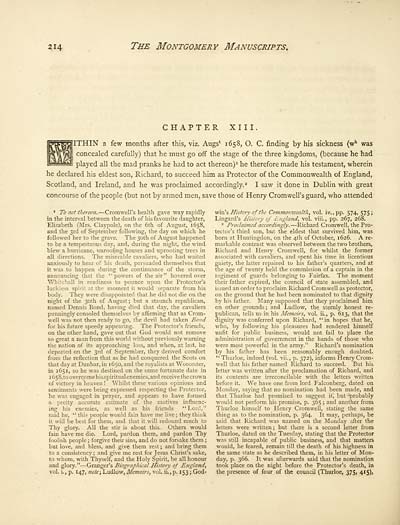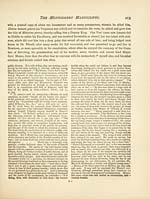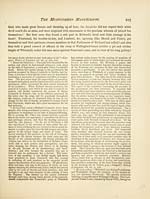Montgomery manuscripts
(228) Page 214
Download files
Complete book:
Individual page:
Thumbnail gallery: Grid view | List view

214
The Montgomery Manuscripts,
chapter XIII.
ITHIN a few months after this, viz. Augs' 1658, O. C. finding by his sickness (w h was
concealed carefully) that he must go off the stage of the three kingdoms, (because he had
played all the mad pranks he had to act thereon) 1 he therefore made his testament, wherein
he declared his eldest son, Richard, to succeed him as Protector of the Commonwealth of England,
Scotland, and Ireland, and he was proclaimed accordingly. 2 I saw it done in Dublin with great
concourse of the people (but not by armed men, save those of Henry Cromwell's guard, who attended
1 To act thereon. — Cromwell's health gave way rapidly
in the interval between the death of his favourite daughter,
Elizabeth (Mrs. Claypole), on the 6th of August, 1658,
and the 3rd of September following, the day on which he
followed her to the grave. The 30th of August happened
to be a tempestuous day, and, during the night, the wind
blew a hurricane, unroofing houses and uprooting trees in
all directions. The miserable cavaliers, who had waited
anxiously to hear of his death, persuaded themselves that
it was to happen during the continuance of the storm,
announcing that the "powers of the air" hovered over
Whitehall in readiness to pounce upon the Protector's
luckless spirit at the moment it would separate from his
body. They were disappointed that he did not die on the
night of the 30th of August; but a staunch republican,
named Dennis Bond, having died that day, the cavaliers
punningly consoled themselves by affirming that as Crom-
well was not then ready to go, the devil had taken Bond
for his future speedy appearing. The Protector's friends,
on the other hand, gave out that God would not remove
so great a man from this world without previously warning
the nation of its approaching loss, and when, at last, he
departed on the 3rd of September, they derived comfort
from the reflection that as he had conquered the Scots on
that day at Dunbar, in 1 650, and the royalists at Worcester,
in 1 65 1, so he was destined on the same fortunate date in
1 658,10 overcomehisspiritual enemies, and receive the crown
of victory in heaven ! Whilst these various opinions and
sentiments were being expressed respecting the Protector,
he was engaged in prayer, and appears to have formed
a pretty accurate estimate of the motives influenc-
ing his enemies, as well as his friends "Lord,"
said he, " this people would fain have me live; they think
it will be best for them, and that it will redound much to
Thy glory. All the stir is about this. Others would
fain have me die. Lord, pardon them, and pardon Thy
foolish people ; forgive their sins, and do not forsake them ;
but love, and bless, and give them rest ; and bring them
to a consistency ; and give me rest for Jesus Christ's sake,
to whom, with Thyself, and the Holy Spirit, be all honour
and glory." — Granger's Biographical History of England,
vol. i., p. 147, note;hudlow,Memoi?s, vol. ii.,p. 153 ; God-
win's History of the Commonwealth, vol. iv. , pp. 574, 575 >
Lingard's history of England, vol. viii. , pp. 267, 268.
3 Proclaimed accordingly. — Richard Cromwell, the Pro-
tector's third son, but the eldest that survived him, was
born at Huntingdon, on the 4th of October, 1626. A re-
markable contrast was observed between the two brothers,
Richard and Henry Cromwell, for whilst the former
associated with cavaliers, and spent his time in licentious
gaiety, the latter repaired to his father's quarters, and at
the age of twenty held the commission of a captain in the
regiment of guards belonging to Fairfax. The moment
their father expired, the council of state assembled, and
issued an order to proclaim Richard Cromwell as protector,
on the ground that he had been nominated to that dignity
by his father. Many supposed that they proclaimed him
on other grounds; and Ludlow, the sternly honest re-
publican, tells us in his Memoirs, vol. ii., p. 613, that the
dignity was conferred upon Richard, "in hopes that he,
who, by following his pleasures had rendered himself
unfit for public business, would not fail to place the
administration of government in the hands of those who
were most powerful in the army." Richard's nomination
by his father has been reasonably enough doubted.
"Thurloe, indeed (vol. vii., p. 372), informs Henry Crom-
well that his father named Richard to succeed. But his
letter was written after the proclamation of Richard, and
its contents are irreconcilable with the letters written
before it. We have one from lord Falconberg, dated on
Monday, saying that no nomination had been made, and
that Thurloe had promised to suggest it, but probably
would not perform his promise, p. 365 ; and another from
Thurloe himself to Henry Cromwell, stating the same
thing as to the nomination, p. 364. It may, perhaps, be
said that Richard was named on the Monday after the
letters were written ; but there is a second letter from
Thurloe, dated on the Tuesday, stating that the Protector
was still incapable of public business, and that matters
would, he feared, remain till the death of his highness in
the same state as he described them, in his letter of Mon-
day, p. 366. It was afterwards said that the nomination
took place on the night before the Protector's death, in
the presence of four of the council (Thurloe, 375, 415),
The Montgomery Manuscripts,
chapter XIII.
ITHIN a few months after this, viz. Augs' 1658, O. C. finding by his sickness (w h was
concealed carefully) that he must go off the stage of the three kingdoms, (because he had
played all the mad pranks he had to act thereon) 1 he therefore made his testament, wherein
he declared his eldest son, Richard, to succeed him as Protector of the Commonwealth of England,
Scotland, and Ireland, and he was proclaimed accordingly. 2 I saw it done in Dublin with great
concourse of the people (but not by armed men, save those of Henry Cromwell's guard, who attended
1 To act thereon. — Cromwell's health gave way rapidly
in the interval between the death of his favourite daughter,
Elizabeth (Mrs. Claypole), on the 6th of August, 1658,
and the 3rd of September following, the day on which he
followed her to the grave. The 30th of August happened
to be a tempestuous day, and, during the night, the wind
blew a hurricane, unroofing houses and uprooting trees in
all directions. The miserable cavaliers, who had waited
anxiously to hear of his death, persuaded themselves that
it was to happen during the continuance of the storm,
announcing that the "powers of the air" hovered over
Whitehall in readiness to pounce upon the Protector's
luckless spirit at the moment it would separate from his
body. They were disappointed that he did not die on the
night of the 30th of August; but a staunch republican,
named Dennis Bond, having died that day, the cavaliers
punningly consoled themselves by affirming that as Crom-
well was not then ready to go, the devil had taken Bond
for his future speedy appearing. The Protector's friends,
on the other hand, gave out that God would not remove
so great a man from this world without previously warning
the nation of its approaching loss, and when, at last, he
departed on the 3rd of September, they derived comfort
from the reflection that as he had conquered the Scots on
that day at Dunbar, in 1 650, and the royalists at Worcester,
in 1 65 1, so he was destined on the same fortunate date in
1 658,10 overcomehisspiritual enemies, and receive the crown
of victory in heaven ! Whilst these various opinions and
sentiments were being expressed respecting the Protector,
he was engaged in prayer, and appears to have formed
a pretty accurate estimate of the motives influenc-
ing his enemies, as well as his friends "Lord,"
said he, " this people would fain have me live; they think
it will be best for them, and that it will redound much to
Thy glory. All the stir is about this. Others would
fain have me die. Lord, pardon them, and pardon Thy
foolish people ; forgive their sins, and do not forsake them ;
but love, and bless, and give them rest ; and bring them
to a consistency ; and give me rest for Jesus Christ's sake,
to whom, with Thyself, and the Holy Spirit, be all honour
and glory." — Granger's Biographical History of England,
vol. i., p. 147, note;hudlow,Memoi?s, vol. ii.,p. 153 ; God-
win's History of the Commonwealth, vol. iv. , pp. 574, 575 >
Lingard's history of England, vol. viii. , pp. 267, 268.
3 Proclaimed accordingly. — Richard Cromwell, the Pro-
tector's third son, but the eldest that survived him, was
born at Huntingdon, on the 4th of October, 1626. A re-
markable contrast was observed between the two brothers,
Richard and Henry Cromwell, for whilst the former
associated with cavaliers, and spent his time in licentious
gaiety, the latter repaired to his father's quarters, and at
the age of twenty held the commission of a captain in the
regiment of guards belonging to Fairfax. The moment
their father expired, the council of state assembled, and
issued an order to proclaim Richard Cromwell as protector,
on the ground that he had been nominated to that dignity
by his father. Many supposed that they proclaimed him
on other grounds; and Ludlow, the sternly honest re-
publican, tells us in his Memoirs, vol. ii., p. 613, that the
dignity was conferred upon Richard, "in hopes that he,
who, by following his pleasures had rendered himself
unfit for public business, would not fail to place the
administration of government in the hands of those who
were most powerful in the army." Richard's nomination
by his father has been reasonably enough doubted.
"Thurloe, indeed (vol. vii., p. 372), informs Henry Crom-
well that his father named Richard to succeed. But his
letter was written after the proclamation of Richard, and
its contents are irreconcilable with the letters written
before it. We have one from lord Falconberg, dated on
Monday, saying that no nomination had been made, and
that Thurloe had promised to suggest it, but probably
would not perform his promise, p. 365 ; and another from
Thurloe himself to Henry Cromwell, stating the same
thing as to the nomination, p. 364. It may, perhaps, be
said that Richard was named on the Monday after the
letters were written ; but there is a second letter from
Thurloe, dated on the Tuesday, stating that the Protector
was still incapable of public business, and that matters
would, he feared, remain till the death of his highness in
the same state as he described them, in his letter of Mon-
day, p. 366. It was afterwards said that the nomination
took place on the night before the Protector's death, in
the presence of four of the council (Thurloe, 375, 415),
Set display mode to:
![]() Universal Viewer |
Universal Viewer | ![]() Mirador |
Large image | Transcription
Mirador |
Large image | Transcription
Images and transcriptions on this page, including medium image downloads, may be used under the Creative Commons Attribution 4.0 International Licence unless otherwise stated. ![]()
| Histories of Scottish families > Montgomery manuscripts > (228) Page 214 |
|---|
| Permanent URL | https://digital.nls.uk/95235663 |
|---|
| Description | A selection of almost 400 printed items relating to the history of Scottish families, mostly dating from the 19th and early 20th centuries. Includes memoirs, genealogies and clan histories, with a few produced by emigrant families. The earliest family history goes back to AD 916. |
|---|

